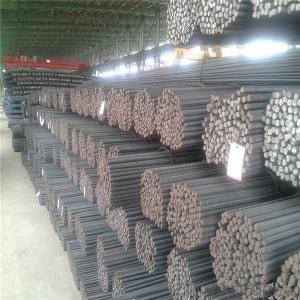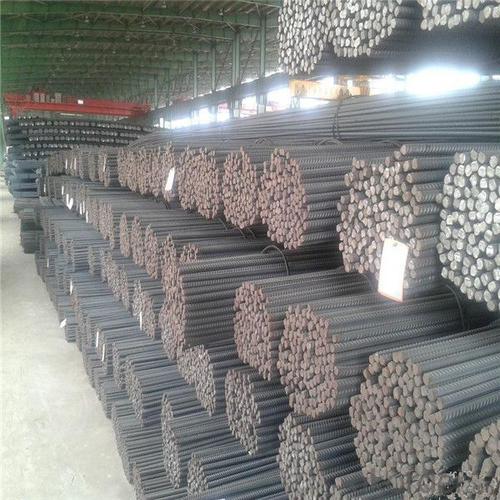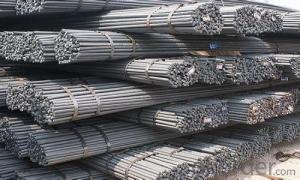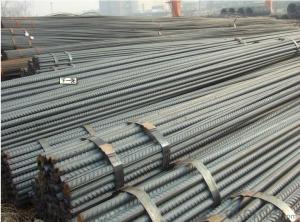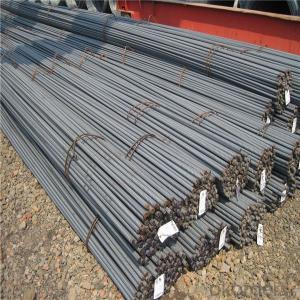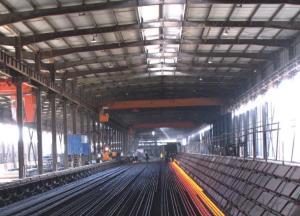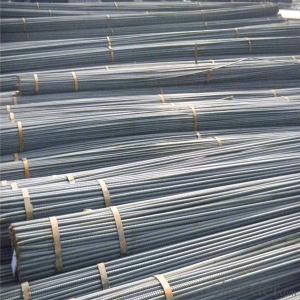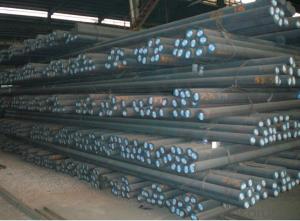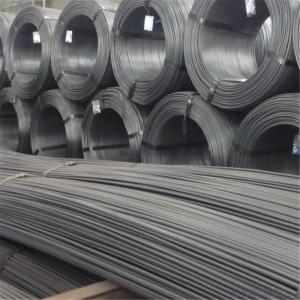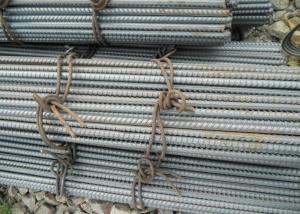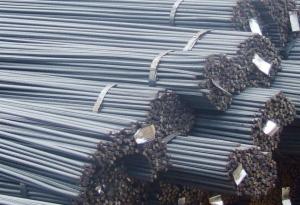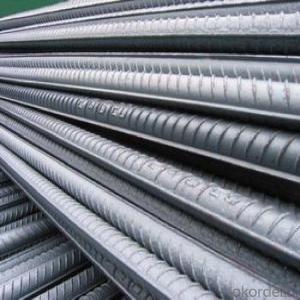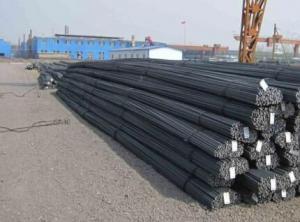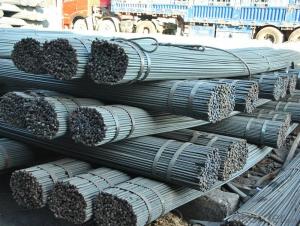Iron Rod and Reinforcing Steel Rebar 6-12m
- Loading Port:
- Tianjin
- Payment Terms:
- TT OR LC
- Min Order Qty:
- 100 m.t.
- Supply Capability:
- 18000 m.t./month
OKorder Service Pledge
OKorder Financial Service
You Might Also Like
Specification
Steel rebar is bars of steel commonly used in construction, especially for reinforcing concrete structures such as driveways,
foundations, walls, and columns. These bars come in different sizes and strength grades, and can be smooth or may include
deformations that provide greater adhesion for concrete poured over the bars. When used in poured concrete, the bars are typically
placed in a grid pattern, the concrete poured over them, and then readjusted to maintain the proper shape while the concrete sets.
Steel rebar can be purchased from a number of manufacturers and is often found at construction retailers or large hardware stores.
Our Advantage: High quality steel products from 1 class mills in China
Reasonable price
Professionalism of the products
On-time delivery
Complete documents and certificates
Sincere service to meet our clients' requirements
Product Description :
Chemical composition (%): | Steel | C | Si | Mn | P | S | Ceq | ||||
HRB335 |
0.25 |
0.80 |
1.60 |
0.045 |
0.045 | 0.52 | |||||
HRB400 | 0.54 | ||||||||||
HRB500 | 0.55 | ||||||||||
Mechanical properties | Steel | Rel/ MPa | Rm/ MPa | A/ % | Agt/ % | ||||||
≥ | |||||||||||
HRB335 | 335 | 455 | 17 |
7.5 | |||||||
HRB400 | 400 | 540 | 16 | ||||||||
HRB500 | 500 | 630 | 15 | ||||||||
Package: | Standard export packing or as customer's request | ||||||||||
Application: | Construction, building, bridge, road. ect | ||||||||||
Payment terms | 1).100% irrevocable L/C at sight. | ||||||||||
Delivery time | 15-30 days after receipt of L/C or deposit by T/T | ||||||||||
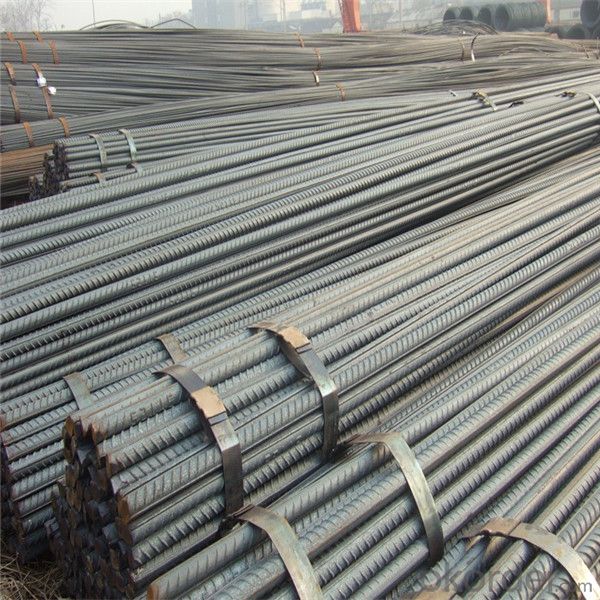
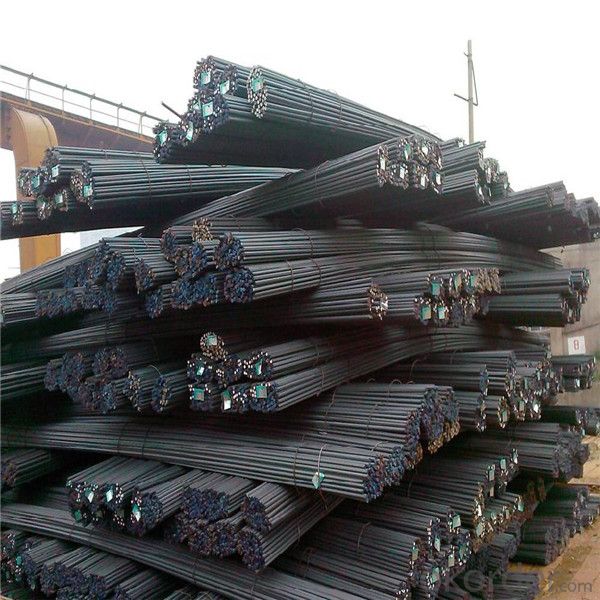
Packing:
In bundles, each bundle weight 3.5 tons. Load by container or by bulk verssel.
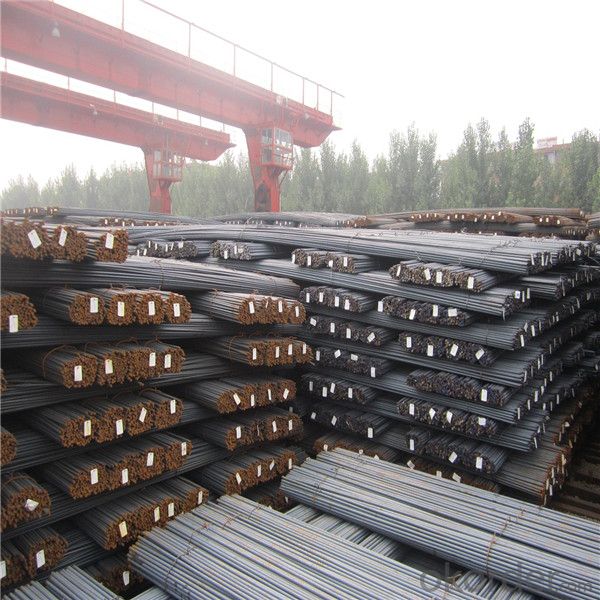

Our service
(1) We cooperate with famous factories with advanced equipment and well trained workers.
(2) We can provide factory price with trading company service.
(3) We continuously work on the improvement of our processes, guaranteeing consistently high standards
of quality to keep none compensation.
(4) We guarantee 24 hours response and 48 hours solution providing service.
(5) We accept small order quantity before formal cooperation.
(6) We deliver the agreed quality at the agreed time, reacting to changes in customer wishes in a flexible way.
(7) Due to our volume and selling power, we have excellent freight rates with shipping lines.
(8) We strive to always be fair and honest in our dealings with customers.
(9) We strive to work together with customers to achieve much more than we can achieve alone.
(10) Through our passion and commitment we aim to be a market leader in all our key markets. To maintain
our position as market leader we must continue to add value in all that we do.
FAQ:
1.Q: What's your MOQ(minimum order quantity)?
A: One full container, mixed acceptable .
2. Q: What's your packing methods?
A: Packed in bundle or bulk ..
3. Q: How can I buy CNBM products in my country?
A:Please send us an inquiry or email ,we will reply to you if there is distributor in your country
4. Q: Can we visit your factory?
A: Warmly welcome. Once we have your schedule, we will arrange the professional sales team to follow up your case.
5. Q: How long does it take to get the product if i place an order?
A:With the process of your requirements,we will pack and deliver in 3-7 days. If it is by sea shipment,it will take 15-45 days depending on different locations
- Q: What are the different surface finishes available for steel rebars?
- There are several surface finishes available for steel rebars, including plain, deformed, epoxy coated, galvanized, and stainless steel. Each finish offers unique properties and benefits depending on the application and environment in which the rebars will be used.
- Q: How are steel rebars classified based on their shapes?
- Steel rebars are classified based on their shapes into various types. One of the commonly used types is the plain round bar, which is a straight cylindrical rod with no deformations or protrusions. Another type is the deformed bar, which has deformations or ribs on its surface. These deformations provide better bonding between the bar and the concrete, thus enhancing the overall strength of the structure. There are different patterns of deformations used in deformed bars, such as ribbed, twisted, and indented. Ribbed bars have evenly spaced protrusions along the length of the bar, which increase the surface area and improve the grip with the concrete. Twisted bars have a helical pattern of deformations, providing a strong grip. Indented bars have small indentations or notches on their surface, enhancing the bond strength. In addition to plain round and deformed bars, there are also other specialized shapes available for specific applications. These include square bars, which have a square cross-section, and rectangular bars, which have a rectangular cross-section. These shapes are often used in applications where the rebars need to be positioned in a specific orientation or where additional strength is required in a particular direction. Overall, the classification of steel rebars based on their shapes allows for the selection of the most suitable type for different construction projects, considering factors such as bonding strength, load-bearing capacity, and specific design requirements.
- Q: What is the cost-effectiveness of using steel rebars?
- The cost-effectiveness of using steel rebars is generally considered to be high. Steel rebars provide strength and durability to reinforced concrete structures, making them a popular choice in construction. One of the key advantages of steel rebars is their long lifespan, which reduces the need for frequent repairs or replacements. This can result in significant cost savings over time, as the initial investment in steel rebars can be recouped through their extended service life. Additionally, steel rebars are readily available and have a comparatively low cost compared to alternative reinforcement materials, such as carbon fiber or fiberglass. This makes steel rebars a cost-effective choice for a wide range of construction projects. Moreover, steel rebars offer excellent tensile strength, allowing them to withstand heavy loads and seismic forces. By reinforcing concrete structures with steel rebars, the risk of structural failure or collapse is significantly reduced. This can lead to additional cost savings by minimizing the need for costly repairs or reconstruction in the event of a disaster. Furthermore, steel rebars are versatile and can be easily fabricated and customized to suit specific project requirements. This versatility allows for efficient installation and reduces labor costs, further enhancing the cost-effectiveness of using steel rebars. In conclusion, the cost-effectiveness of using steel rebars is high due to their long lifespan, comparatively low cost, excellent tensile strength, and versatility. By choosing steel rebars as a reinforcement material, construction projects can benefit from reduced maintenance and repair costs, improved structural integrity, and overall long-term savings.
- Q: Can steel rebars be used in power plant construction?
- Yes, steel rebars can be used in power plant construction. Steel rebars are commonly used as reinforcement in concrete structures, including power plants, to enhance their strength and durability.
- Q: Why is thread steel thinner than crude?
- Reduce the quality of the project, and the use of low carbon steel instead of rebar. For large engineering projects, often appear to "project inspector", to replace the steel rib steel "Choulianghuanzhu", reduce the construction cost. In the design, because the members allowed to provide "stirrup stress support", the main role is to keep the shape and location of longitudinal reinforcement, steel strapping has a smooth surface, accurate positioning, therefore, in addition to longitudinal reinforcement, licensing round steel stirrups. The longitudinal reinforcement must be made of rib steel.
- Q: What is the impact of steel rebars on the overall sustainability of a building?
- Steel rebars have a significant impact on the overall sustainability of a building due to their various environmental, economic, and social implications. Firstly, steel rebars contribute to the durability and resilience of the structure, enhancing the longevity of the building. This means that the building will require fewer repairs and renovations over its lifespan, reducing the need for additional resources and minimizing waste. In terms of environmental impact, steel rebars can be recycled, reducing the demand for new steel production and the associated carbon emissions. Recycling steel rebars also saves energy and reduces the extraction of raw materials, such as iron ore and coal. Additionally, steel rebars can be salvaged and reused in other construction projects, further extending their lifespan and reducing waste. From an economic standpoint, the use of steel rebars can lead to cost savings in construction and maintenance. Steel is a versatile and strong material, allowing for lighter and more efficient designs, which can result in reduced material and labor costs. Moreover, the recyclability and salvagability of steel rebars can provide economic benefits through the resale or repurposing of the material. Furthermore, steel rebars play a crucial role in ensuring the safety and structural integrity of buildings, especially in areas prone to earthquakes or high winds. By providing reinforcement to concrete, steel rebars enhance the resistance of the building to external forces, reducing the risk of collapse or damage during natural disasters. This aspect of safety is essential for the wellbeing of occupants and the community at large. In conclusion, steel rebars have a positive impact on the overall sustainability of a building. They contribute to durability, reduce environmental impacts through recycling and reuse, offer economic benefits, and enhance the safety of the structure. Incorporating steel rebars in construction projects can significantly improve the long-term sustainability and resilience of buildings.
- Q: How is thread steel made?
- Rebar is a ribbed steel bar, also known as ribbed steel, usually with 2 longitudinal ribs and transverse ribs uniformly distributed along the length. The transverse rib shape is helical, herringbone, crescent 3. Expressed in millimeters of nominal diameter. Nominal diameter of round steel bars of equal diameter equal to the cross section of ribbed bars. The nominal diameter of the steel bar is 8-50 mm, and the recommended diameters are 8, 12, 16, 20, 25, 32 and 40 mm. Ribbed steel bars are mainly subjected to tensile stress in concrete. Because of the function of rib and the greater bonding ability of concrete, ribbed steel bar can bear the effect of external force better. Ribbed steel bars are widely used in a variety of building structures, especially large, heavy, light, thin-walled and high-rise structures.
- Q: What are the guidelines for proper tying of steel rebars in concrete structures?
- To ensure the structural integrity and durability of concrete structures, it is crucial to adhere to guidelines for the proper tying of steel rebars. Here are some important guidelines to consider: 1. Rebar Placement: Before tying, accurately position the rebars according to the structural drawings and design specifications. Place them at the designated locations and depths, ensuring proper spacing to provide the necessary strength and reinforcement. 2. Tying Tools: Utilize suitable tools like pliers or rebar tying machines for secure and proper tying. Ensure that the tools are in good condition and appropriate for the size and type of rebars being used. 3. Tying Technique: Employ a consistent and efficient tying technique. Begin by securely holding the rebars together at the intersection point. Wrap the tie wire around both rebars multiple times, ensuring tight and firm connections. Properly twist and neatly cut the tie wire to avoid any protrusions. 4. Tie Wire Selection: Use high-quality tie wires with sufficient strength to withstand tension and load requirements. Opt for corrosion-resistant materials such as galvanized steel or stainless steel to prevent rusting and deterioration over time. 5. Tying Spacing: Adhere to the specified tying spacing as per the design requirements. Adequate spacing between ties helps maintain rebars in their designated positions, preventing displacement during concrete pouring and subsequent curing. 6. Tying Quantity: Tie rebars at suitable intervals to ensure ample connection and reinforcement. The number of ties needed depends on the size, shape, length of rebars, and structural design specifications. 7. Tying Consistency: Maintain consistency in tying throughout the entire concrete structure. Uneven or inconsistent tying can result in weak points, reduced reinforcement, and compromised structural integrity. 8. Tying Safety: Prioritize safety during the tying process. Wear appropriate personal protective equipment (PPE) like gloves and safety glasses to prevent injuries. Take precautions to avoid tripping hazards and ensure a safe working environment. 9. Inspection and Quality Control: Regularly inspect the tied rebars to ensure compliance with design specifications and quality standards. Conduct visual inspections and perform pull tests to assess the strength and effectiveness of the ties. 10. Compliance with Codes and Standards: Adhere to local building codes, industry standards, and engineering guidelines specific to your region. These codes provide essential requirements for rebar tying, ensuring the durability and safety of the concrete structure. By following these guidelines, construction professionals can enhance the strength, stability, and longevity of concrete structures through proper tying of steel rebars.
- Q: How do steel rebars affect the overall fire rating of a building?
- Steel rebars can have a positive impact on the overall fire rating of a building. By reinforcing concrete structures, rebars can help enhance the fire resistance of the building. Steel has high melting and ignition temperatures, which means it can withstand heat and maintain its structural integrity for longer periods during a fire. This additional durability provided by rebars can help prevent structural collapse, allowing occupants more time to evacuate safely and aiding firefighters in their efforts to suppress the fire.
- Q: Do steel rebars increase the overall weight of a structure?
- Yes, steel rebars do increase the overall weight of a structure. Rebars are typically added to reinforce concrete structures, providing tensile strength to counteract the concrete's weakness in handling tension forces. Steel rebars are made of steel, which is a dense and heavy material. When incorporated into a structure, the weight of the rebars adds to the total weight of the construction. However, the additional weight is usually negligible compared to the overall weight of the structure, especially in large-scale projects. The benefits of using steel rebars in terms of structural integrity and durability far outweigh the minimal increase in weight they contribute.
Send your message to us
Iron Rod and Reinforcing Steel Rebar 6-12m
- Loading Port:
- Tianjin
- Payment Terms:
- TT OR LC
- Min Order Qty:
- 100 m.t.
- Supply Capability:
- 18000 m.t./month
OKorder Service Pledge
OKorder Financial Service
Similar products
Hot products
Hot Searches
Related keywords
